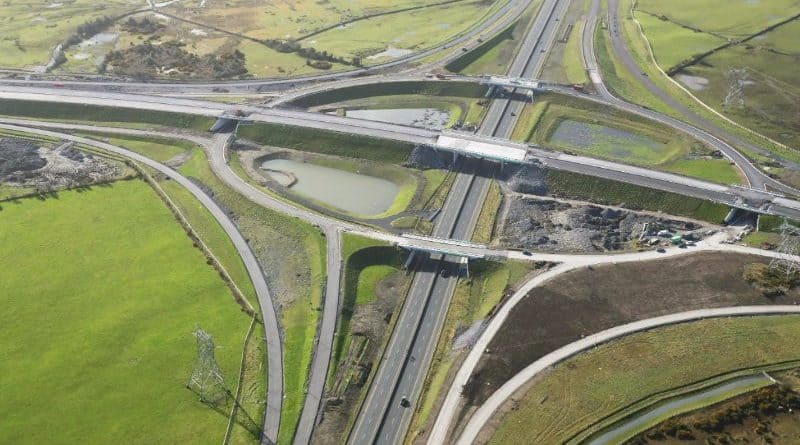Increased investment in infrastructure at critical time for Irish economy welcomed
The Construction Industry Federation (CIF) has stated that the measures announced today will help address the systemic weaknesses in infrastructure investment.
 Tom Parlon, CIF Director General stated; “The Government has taken significant steps today towards insulating the economy from externals shocks today with the announcement of a 17% increase of €790m in public capital. These measures will also support other housing measures announced today.
Tom Parlon, CIF Director General stated; “The Government has taken significant steps today towards insulating the economy from externals shocks today with the announcement of a 17% increase of €790m in public capital. These measures will also support other housing measures announced today.
Recent commitments to increase investment in infrastructure are to be welcomed. The Minister recognises that Ireland, currently last in the terms of GDP invested in infrastructure at EU level, must invest. Translating these announcements into action on the ground is always challenging for Governments faced with balancing the budget. Recent increases are to be delay until 2019 but staving off this sort of investment until 2019 will unnecessarily delay the economic and social benefits of infrastructure delivery. Smart investment now in preparatory work can bring forward delivery dates for major infrastructure projects.
[rev_slider Surety]
CIF’s budget analysis, supported by DKM consultants and Construction Information Services, showed only €350million per year up to 2021 to invest in new infrastructure projects. Whilst the figures quoted in the Public Capital Programme are vast, the proportion that is spent on new productive infrastructure, for example, roads, rail, broadband, schools, hospitals are reducing each year. DKM’s estimates of the amount of additional funding DKM’s analysis shows that there available (€350m per year up to 2021) could be absorbed by just one of the critical strategic projects required. In addition, the analysis found an increasing proportion of the Public Capital Programme is spent on maintenance of significantly depreciated stock and 40% of the ‘capital’ is not being spent on productive or social infrastructure ie. roads, rail or schools.
Home Building Finance Agency
Tom Parlon stated:
The CIF and RSM accountants recently identified a market failure in the availability of finance for construction companies. 66% of housebuilders reported difficulty in accessing finance today to fuel viable construction projects. The Government’s announcement of a €750 fund to be administered by the newly established Housebuilding Finance Ireland to drive housebuilding is to be welcomed.
As such, we welcome the establishment of this agency and the €750m ISIF fund as it may bridge the funding gap by providing funding at competitive levels where there is an established demand for housing but no lending from traditional sources available.
In addition, the additional €75million for the Local Infrastructure Housing Activation Fund, will go to a long way to facilitating essential infrastructure to enable additional housebuilding.”
Social Housing
The CIF welcomed the significant increases announced in support of social housing. The €500million announced to deliver new build social housing is very welcome and signifies that the Government are again ‘building’ social housing.
Help to Buy Scheme for first-time buyers.
Tom Parlon stated;
“The Help to Buy scheme has had a positive impact on increasing supply in the problematic starter segment without contributing significantly to increasing house prices. Our members are reporting significant increases in activity in the starter/first-time buyer segment with the HTB supporting over 60% of new builds. The HTB scheme has meant that banks have begun to lend to builders for activity in this segment again.
Vacant site levy of 7%
Tom Parlon stated:
The CIF supports the principle of a site value tax aimed at preventing land hoarding. The increase in the site levy of 7% must applied fairly and impartially so that genuine landowners/housebuilders’ experiencing viability issues are not unnecessarily penalised.
In applying this levy on a case by case basis, the Government must be cognisant that house-builders buy forward land that can take up to five years to be construction ready.
If the levy is not applied in this manner, the 7% tax per annum will dissuade housebuilders from taking on projects on the margins of financial viability. In addition, the levy should only be applied to sites that are currently construction ready and viable in the current market ie with all essential infrastructure in place as residential construction cannot take place until this point.
Commercial Stamp Duty Increases
We are concerned about the significant impact on costs of commercial property. This might have a dampening effect on investment in the coming years at a time when we are competing for FDI and facing Brexit.
The CIF, however, welcomed the proposed rebate on land purchased for residential exempting in commercial stamp duty. The 30 month time limit on the development of this land will be challenging as the timeframe for securing planning and all related requirements can range from three to five years.
Capital Gains Tax
The CIF welcomes the government’s amendment to the 7-Year Capital Gains Tax Exemption, as it encouraged the retention of property with no incentive to develop land purchased during the relevant period.
Employment issues
the CIF lamented the Government’s refusal to reintroduce eligibility to partial rebate for statutory redundancy payments for construction employers. This measure would encourage employers to invest more in staff in what is a traditionally transient workforce. This is a critical measure in construction where the labour force is fragmented with labour agencies representing most of direct employment.

